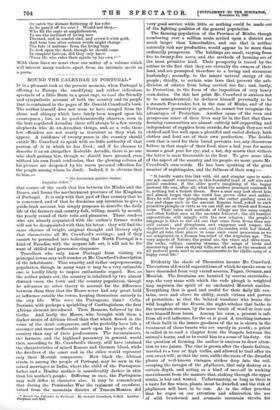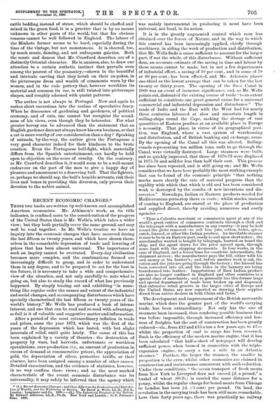ROUND THE CALENDAR IN PORTUGAL.*
IT is a pleasant task at the present moment, when Portugal is offering to Europe the unedifying and rather ridiculous spectacle of a little State in a great rage, to read the friendly and sympathetic account of both the country and its people that is contained in the pages of Mr. Oswald Crawfurd's book. The author himself does not seem to have escaped from the abuse and obloquy which have lately been heaped upon his countrymen ; but, as he good-humouredly observes, even in the best-regulated Arcadias there will always be a few unruly shepherds who do un-Arcadian things, and, as a rule, these few offenders are not nearly so truculent as they wish to appear. A residence of twenty years in the country should entitle Mr. Crawfurd to speak with no little authority of that portion of it in which he has lived ; and if he chooses to describe it as an altogether desirable Arcadia, there is no one who shall gainsay him, though we should have guessed, even without his own frank confession, that the glowing colours of his picture are deepened by his warm personal affection for the people among whom he dwelt. Indeed, it is obvious that to him,— " ille terrarum pruter omnes
Angulus ridet,"
that corner of the earth that lies between the Minho and the Douro, and forms the northernmost province of the Kingdom of Portugal. It is only with that part of that country that he is concerned, and of that he disclaims any intention to give a guide-book account, but simply proposes to describe the daily life of the farmers and country-folk, telling, month by month, the yearly round of their toils and pleasures. Those readers who are already acquainted with the author's former works will not be disappointed with this, his latest : they will find the same charms of bright, original thought and literary style that characterise all Mr. Crawfurd's writings ; and if they cannot be persuaded into believing that North Portugal is a kind of Paradise with the serpent left out, it will not be for want of skilled and persuasive eloquence.
Travellers who only know Portugal from visiting its principal towns may well wonder at Mr. Crawfurd's description of the inhabitants. That swarthy and rather unprepossessing population, though in many ways it may be a very estimable one, is hardly likely to inspire enthusiastic regard. But, as the author points out, the country is inhabited by two almost distinct races, the town and the country population, though he advances no other theory to account for the difference between them than that the Moors never had any great hold or influence outside the towns, keeping themselves entirely to the city life. Who were the Portuguese, then ? Celts, Iberians, with perhaps a sprinkling of Carthaginians, the first African element introduced. Then Romans, followed by the Goths. And lastly the Moors, who brought with them a darker strain of African blood than that which flowed in the veins of the Arab conquerors, and who probably have left a stronger and more ineffaceable mark upon the people of the country than any of their predecessors. The mountaineers, the farmers, and the highland peasantry in general, would then, according to Mr. Crawfurd's theory, still have retained the characteristics of mixed Roman and German blood, while the dwellers of the coast and in the cities would represent only their Moorish conquerors. How black the African strain is among the people of Portugal, may be seen in the mixed marriages in India, where the child of the Portuguese father and a Hindoo mother is considerably darker in skin than his mother's people. Differing in race, the Portuguese may well differ in character also. It may be remembered that during the Peninsular War the regiment of cacadores, raised from the mountain district of Tras-os-Montes, did
• Bound the Calendar in Portugal. By Oswald Crawford, C.M.G. London : Chapman and Hall.
very good service, while little or nothing could be made out of the fighting qualities of the general population.
The farming population of the Province of Minho, though numbering over a million souls, settled upon a district not much larger than Lincolnshire, and one that is neither naturally rich nor productive, would appear to be more than ordinarily prosperous. The holdings are small, varying from five to twenty-five acres, and the methods of farming are of the most primitive kind. Their prosperity is traced by the author to the fact that they are virtually the owners of their land, and are prompted therefore to a loving and strenuous husbandry ; secondly, to the innate natural energy of the people ; thirdly, to certain wise laws that prevent the sub- division of estates from being carried too far; and, lastly, to Protection, in the form of the imposition of very heavy corn-duties. On this last point Mr. Crawfurd is anxious not to be misunderstood ; he declares himself personally to be a staunch Free-trader, but in the case of Minho, and of the Portuguese peasantry in general, he cannot but recognise the advantages of Protection. Another cause of the even and prosperous tenor of their lives may lie in the fact that these farming communities are almost entirely self-supporting and independent of supplies from outside, for though they are well clothed and live well upon a plentiful and varied dietary, both clothes and food are of their own production. The double corn that is used for their bread prevents, too, any dis'astrons failure in that staple of their food, since a bad year for maize means a good year for rye, and a hot, dry season that withers the latter is most favourable to the first. To give some idea of the aspect of the country and its people, we must quote Mr. Crawfurd's own words. He has been speaking of the great number of nightingales, and the fullness of their song :—
" It hardly wants this link with old and simpler ages to make one ask oneself sometimes, in this beautiful land of soft airs and genial sunshine, if the older poet's imagining of the happy pastoral life was, after all, what the modern pessimist contends it is, nothing but a foolish dream. Here a man may look about him and almost forget that the world has grown older and sadder. Here he will see the ploughman and the carter guiding oxen in size and shape such as the ancient Romans bred, yoked to such primitive ploughs or carts as we can still see on Greek and Roman coins. Their rules and methods of tillage are the same simple and often foolish ones as the ancients followed ; the old heathen superstitions still mingle with the new religion ; the people's language is liker to the old one that came from Rome than any still extant ; and ploughman and waggoner and reaper, the shepherd in his goat's-skin coat, and the maiden with her distaff, might all take their places in some such rural procession as we see sculptured on a Roman bas-relief of the Augustan age. The very aspects of Nature, the genial air, the vines and olive-trees, the rocks, valleys, running streams, the songs of birds and murmuring of bees on thymy hills, are all such as the sweetest of all pastoral poets used as accompaniments to his idyllic song of a happy rural life."
Evidently the shade of Theocritus haunts Mr. Crawfurd.
The curious old-world superstitions of which he speaks seem to have descended from very varied sources, Pagan, German, and Moorish. The fountains are haunted by mouras emeantada.s ; nay, the very stone with which the rude plough is weighted may imprison the spirit of an enchanted Moorish maiden.
Everything that is good and useful for their daily life con- tains, over and above its utility, occult virtues and powers of protection ; so that the belated wanderer who hears the wild laughter of the Bruxas, the night-witches that bathe in the mountain streams, by the mere touch of wood or iron can save himself from harm. Among his oxen, a peasant is safe from all evil influence, for the ox is good. A touching instance of their faith in the innate goodness of the ox is shown in the treatment of those beasts who are unruly in youth ; a priest is called in to read a chapter from the Gospels between the animal's horns, and so to recall him to a sense of his duty. On the question of farming, the author is anxious to draw atten- tion to two points. The vine is grown after the classic fashion, married to a tree or high trellis, and allowed to trail after its own sweet will; so that the root, unlike the roots of the dwarfed plants of well-known vintages, strikes deep into the soil, escaping the ravages of the phylloxera, that only destroy at a certain depth, and acting as a kind of save-all in sucking nourishment from the manure that, sinking through the upper strata, is lost and wasted. Unfortunately, as long as there is a taste for fine wines, plants must be dwarfed, and the risk of phylloxera will have to be ran. As to the other practice that he urges on our attention and admiration, the use of wild brushwood and aromatic mountain shrubs for cattle bedding instead of straw, which should be chaffed and mixed in the green food, it is a practice that is by no means unknown in other parts of the world, but that for obvious reasons cannot be well followed in England. The labour of the Minhote farmer seems to be hard, especially during the time of the vintage, but not monotonous. it is cheered, too, by much music, dancing, and not unfrequent gaieties. Both the music and dances that Mr. Crawfurd describes are of a distinctly Oriental character. He is anxious, also, to draw our attention to a certain esthetic instinct that prevails even among the poorest of the peasantry,—shown in the beautiful and intricate carving that they lavish on their ox-yokes, in the picturesque dress and wealth of ornaments worn by the women, and in the rude pottery that, however worthless its material and common its use, is still twisted into picturesque shapes, and roughly adorned with quaint patterns.
The author is not always in Portugal. Now and again he makes short excursions into the realms of speculative fancy. When he discourses of gardening and gardeners, of political economy, and of cats, one cannot but recognise the sound- ness of his views, even though they be heterodox. For what greater heresy can be advanced than the statement that an English gardener does not always know his own business, or that a cat is more worthy of our consideration than a dog ? Speaking of animals, by-the-way, the author gives the Portuguese a very good character indeed for their kindness to the brute creation. Even the Portuguese bull-fight, which materially differs from the Spanish entertainment, can hardly be held open to objection on the score of cruelty. On the contrary, as Mr. Crawfurd describes it, it would seem to be a well-meant endeavour on the part of the men to give a happy day of pleasure and amusement to a deserving bull. That the fighters, or, perhaps we should say, the bull's humble servants, risk their lives and bones in providing this diversion, only proves their devotion to the nobler animal.



















































 Previous page
Previous page